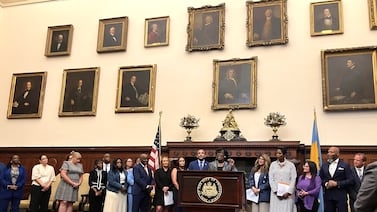Sign up for Chalkbeat Newark’s free newsletter to get the latest news about the city’s public school system delivered to your inbox.
A coalition of plaintiffs that sued New Jersey for its failure to fix deeply-rooted de facto segregation in its public school system has asked a higher court to reverse a trial court decision that denied a clear ruling in their favor.
Latino Action Network and NAACP New Jersey State Conference, among other groups and families that comprise the plaintiffs, sued the state in 2018. Using publicly available data, they argued that New Jersey’s public school system, one of the most segregated in the nation, was unconstitutionally segregated by race and socioeconomic background.
A trial court judge issued a mixed opinion in 2023 that stopped short of ordering the state to fix its segregated school system, which prompted the parties to attempt to reach a resolution in mediation.
But by February, after more than a year of meetings, the mediation discussions proved fruitless, bouncing the case back to the courts just as the Trump administration began directly targeting diversity, equity, and inclusion policies and practices in K-12 and higher education spaces.
This case has been one of few nationally to address systemic racial and socioeconomic segregation on a statewide level. A decision on the case could have reverberations across the country at a time when policies to strengthen DEI practices are under threat by the federal government.
Now, the plaintiffs want the appellate court to step in and make a judgement on the state’s liability for allowing de facto segregation to endure in its school system despite it violating the state constitution — which is explicit in its ban on school segregation.
“Indeed, the trial court agreed with plaintiffs on the central constitutional questions before it and acknowledged that the state defendants failed to act to correct this segregation,” attorneys wrote in court documents filed on Tuesday in the Superior Court of New Jersey Appellate Division. “But rather than reach the only logical conclusion that followed — that the state defendants violated plaintiffs’ constitutional rights — the trial court left the question of liability for another day.”
The plaintiffs are asking the higher court to grant its motion to appeal, allow for another full briefing and argument, and reverse Judge Robert Lougy’s decision “so that the parties can finally proceed to the remedial phase of this litigation,” the court documents stated.
Opposition briefs from the defendants, which includes the state’s Education Department and education commissioner, are due April 28.
When the cases were being argued in trial court, the state’s defense pushed back on the plaintiff’s data, saying it was relying only on demographics from a select group of school districts — which included cities such as Newark and Camden — and questioned if it was a far-reaching statewide issue.
State agencies had not responded to requests for comment by publication.
Plaintiffs argue judge’s ruling had flaws
In Lougy’s 99-page opinion, he stated that the plaintiffs demonstrated persistent “racial imbalance in numerous school districts” but failed “to prove that the state’s entire educational system is unconstitutionally segregated.” The attorneys for the plaintiffs argued in court documents this week that Lougy’s conclusion “defies logic” and “fails to fulfill the court’s duty” to order remedies for “constitutional wrongs like those at issue here.”
They also argued against another part of Lougy’s opinion about there being “no practical solution” to school segregation. That finding, they stated in their argument, was “premature, irrelevant to the question of liability,” and unsupported by what was on the record, according to court documents.
In challenging Lougy’s opinion on possible solutions, the plaintiffs pointed out the possible remedies they provided during the trial court argument that would help integrate schools. Those remedies included interdistrict magnet schools and removing the state’s residency statute, which prevents families from enrolling their students across municipal boundaries.
The plaintiffs also argued that there continues to be an injustice to students across the state who are enrolled in segregated schools — defined as 90% or more of the student population identifying as non-white — the longer this case remains in litigation.
Among the plaintiffs are students who were in the fifth grade when the lawsuit was filed seven years ago and are now about to graduate from high school in two months, the court documents show. Other students among the plaintiffs had not yet started kindergarten at the time the lawsuit was filed and will be headed to the seventh grade this fall, according to court documents.
“The protracted nature of this litigation…has already delayed the resolution of this matter and caused real and irreparable harm to students,” the attorneys for the plaintiffs stated in Tuesday’s court documents. “For some, including some plaintiffs in this case, it is too late.”
Not granting the appeal or addressing the issues they presented “would consign yet another generation of New Jersey students to a similar fate,” they added.
Few are aware of New Jersey’s school segregation
New Jersey was ranked as having the sixth most segregated school system for Black students and seventh most segregated school system for Latino students in a 2017 report on the state’s segregated schools from The Civil Rights Project. Even so, most New Jersey voters were unaware of the lawsuit and few were aware that the state has among the most segregated school systems in the country, according to a Fairleigh Dickinson University Poll from the fall.
Though not originally listed as defendants in the suit, representatives of charter schools and renaissance schools became intervenors on the case, meaning they have a stake in its outcome. In New Jersey, renaissance schools are a charter-district hybrid, run by a nonprofit but funded by the public school district at a greater rate than charter schools.
Charter school representatives have previously stated that charter schools could play a role in integrating public schools as they allow for enrollment across municipal boundaries.
Recent research has shown racial and economic school segregation has increased in the last 30 years nationwide, particularly in large school districts. A 2024 report out of Stanford and the University of Southern California found that policies favoring school choice and parental preference, in addition to the end of court oversight that required school integration for certain districts, were two major drivers of the increase.
Catherine Carrera is the bureau chief for Chalkbeat Newark. Contact Catherine at ccarrera@chalkbeat.org.






